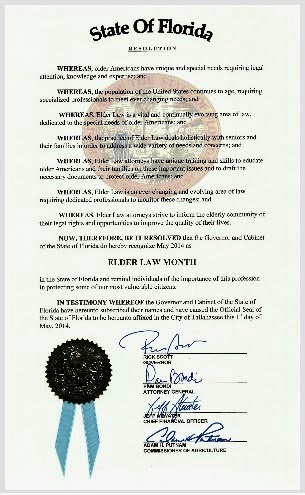In May, Florida and many other states in the United States will celebrate Elder Law Month. Why does an area of law get a month of celebration?
Elder Law is a specialized area of law that involves representing, counseling, and assisting seniors, people with disabilities, and their families in connection with a variety of legal issues, from estate planning to long term care issues, with a primary emphasis on promoting the highest quality of life for the individuals. Typically, Elder Law attorneys address the client’s perspective from a holistic viewpoint by discussing legal, medical, financial, social, and family issues. (National Academy of Elder Law Attorneys)
Elder Law is not defined by a set of laws, but the client served. Elder Law attorneys take a holistic approach to assisting clients and use both legal tools and techniques as well as public and community resources to meet the goals and objectives of their clients, including maintaining their quality of life. Elder Law attorneys work with a variety of professionals in various fields to help clients obtain quality health and long term care services and ensure their needs are met.
Using this holistic approach, Elder Law attorneys address general estate planning issues, planning for incapacity with alternative decision making documents, and how to obtain quality care that meets a client’s moral, ethical and familial objectives. Elder Law attorneys help clients locate appropriate care, coordinating private and public resources to finance the cost of care, and working to ensure the client’s right to quality of life is maintained regardless of the client’s residential setting.
Elder Law attorneys can help elders, persons with disabilities, and the families that take care of them with several key areas that impact their lives:
- Estate Planning,
- Estate and Gift Tax Planning,
- Guardianship,
- Conservatorship,
- Medicaid,
- Medicare,
- Public Benefit Programs,
- Retirement Benefits,
- Age Discrimination,
- Abuse/Neglect of Vulnerable Adults,
- Exploitation of Vulnerable Adults,
- Housing for Those with Disabilities,
- Residents’ Rights in Housing & Institutions,
- Fiduciary Representation,
- Long-Term Care Financing,
- Medical Decision Making,
- Financial Decision Making,
- Disability Planning and Insurance, and
- Probate.



